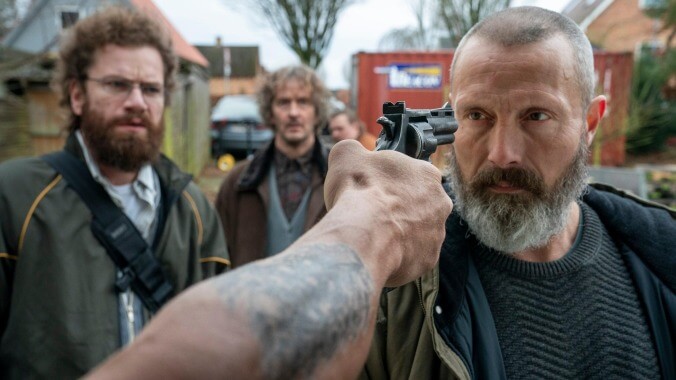Mads Mikkelsen climbs aboard the Taken train with the uneven, darkly comic Riders Of Justice

Note: The writer of this review watched Riders Of Justice on a digital screener from home. Before making the decision to see it—or any other film—in a movie theater, please consider the health risks involved. Here’s an interview on the matter with scientific experts.
One of European comedy’s most reliable stock types is the dunderheaded academic, that erudite boob who knows so much about so much and yet hopelessly little about human nature. There’s not really an equivalent in the American cinema, but in parts abroad, this figure can be found getting his laughs (and they do always seem to be male, the cluelessness inextricable from the masculinity) by attempting to wrestle the messiness of life into order through hypotheses, theorems, and experiments. In recent years, we’ve seen him try to think through the crisis of modern media in Olivier Assayas’ Non-Fiction and drink through the crisis of midlife in Another Round, neither to much avail. Riders Of Justice, another Danish import starring Mads Mikkelsen, first acquaints us with a pair of statisticians as they deliver a sketchy presentation positing that algorithms can extrapolate the outcome of anything in the universe. Events to come, tragic until they’re just blackly humorous, will test this conjecture.
One of the eggheads, the doleful Otto (Nikolaj Lie Kaas), goes right from his dismissal by a board skeptical of his research to a catastrophic train accident that puts it into practice. His inquest to determine what took place during the fateful moments of the crash, and the eternal struggle between causality and chance interrogated along the way, form the philosophical center of this contemplative slant on the Coen-esque misfortune-and-vengeance yarn. Things take a turn for the grisly as Otto links up with Markus (Mikkelsen), whose wife perished in that same crash, and they trace this seeming coincidence back to the biker gang lending the film its sublimely dopey title. While Otto and his buddies, Lennart (Lars Brygmann) and Emmenthaler (Nicolas Bro), use facial recognition software to sniff out the mastermind behind the scenes, former soldier Markus and his unchecked rage issues pursue more traditional, mandible-shattering means of investigation. Aside from their shared preoccupation with disproving destiny, the two haven’t much in common—a clash reflected in the uneven tone struck by director Anders Thomas Jensen.
In a sense, the rather lean theme of happenstance’s cruel randomness ties together two movies: a comedy of errors involving overeducated fools deluded enough to think they can hack the fabric of reality, and a rampaging Taken variant led by the stone-faced, brutal Markus. The latter appears first while stationed in Afghanistan, on a mission to instill the same order that will elude him once he receives the sad news about his spouse and returns home to care for his daughter, Mathilde (Andrea Heick Gadeberg). Gaining control over his surroundings and his temper gives him an emotional arc somewhat out of step with the character’s default wryness, especially once Jensen has introduced a beta-hipster boyfriend (Albert Rudbeck Lindhardt) for Mathilde and a rescued sex slave (Gustav Lindh) as unlikely sidekicks intended to soften him. Forming a ragtag surrogate family unit to replace the one already destroyed illustrates the facile moral that love may be the one thing we can count on in the face of the unpredictable and inexplicable. It’s an unduly tidy conclusion to a meditation on how stubborn and messy existence really is.
Jensen, a prolific screenwriter (he cowrote The Dark Tower’s impenetrable yet unmemorable script for fellow Dane filmmaker Nikolaj Arcel), last stepped behind the camera for 2015’s Men And Chicken, which also found sentimentality in improbable places. A heartwarming tale of incest, bestiality, and compulsive vomiting, it struck a balance between outré instincts and a gooier core, the same contrast at play in his latest feature. This time around, however, the gap between the humanism and the hairier genre elements ironically playing against it isn’t so drastic. Markus may be on the warpath, but the trail of carnage left behind is limited to a few broken fingers, an offscreen beatdown, and a shootout. It helps that these scenes are consistently funny, filled with bickering over esoteric minutiae; Otto and Lennart have it out over the utility of competing data models, and the technical particulars of their dialogue sound credible enough to work as schtick.
A scattered but likable jumble, the film has a thoughtful manner more than it has actual thoughts, much like the trio of quasi-intellectuals joining forces with Markus. In their case, the so-smart-you’re-dumb quality works just fine as a gag, but Jensen can hardly conjure anything more profound. He and his work are at their best when doing rather than pontificating. Though the goal is melding brawn and brains via the effective bonding agent of dry levity, these separate forces act in uncomfortable opposition to one another. It’s an equation that Otto and his colleagues would spend an afternoon tinkering with, and like the film, never solve.